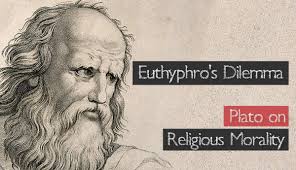The Core Dilemma
Euthyphro’s Dilemma raises the following question: Does God command something because it is inherently good or is it good purely because God commands it?
Atheistic Perspective
The First Scenario
Does God command things because they are inherently good?
If this is true, the Atheist posits, then morality is something that exists outside of God. Rather, God has a dependency on and a requirement to act based on an external and self-contained moral code. This renders him non-omnipotent because this moral code is not in his power.
Moreover, we can go directly to that self contained source of morality and bypass God. We don’t need God for morality. And in this case morality can be objective for both theists and atheists alike.
The Second Scenario
Are things only good because God commands them?
If this is true, the Atheist says, then good and evil are arbitrary since if God wishes, he can capriciously change his commands and literally flip flop them every day. What was good yesterday can become evil tomorrow and what was evil yesterday can be good tomorrow.
The Atheist says sure, God commands you to take care of your children today, but let’s say he told you tomorrow to beat your two year old toddler to death. Would this be considered good?
Moreover, he says to the theist, if this is the case, then good and evil are subjective even in your worldview. How so? Because you accuse us of subjective morality since things we considered bad twenty years ago are now considered good (gay marriage). So he says that the same applies to you. What was good yesterday, can be bad tomorrow if God changes his command. The only difference is that you have just pushed the subjectivity up one level to God.
The Muslim Response
The First Scenario Revisited
Does God command things because they are inherently good?
The problem here is obvious. A Muslim would dismiss this fork of the dilemma because this paints a picture of God as someone who has no hand in good or bad and rather is reliant on an external moral compass. Morality cannot be separated from God’s essence.
The Second Scenario Revisited
Are things only good because God commands them?
Yes, we accept.
The Muslim says, yes. We concur that things are purely good because God commands them. However, we fully reject the derived conclusion of arbitrariness. Rather, they are based on God’s encompassing knowledge of what he created and the purpose with which he created it.
To establish this, all we have to do to disprove the Atheists conclusion is show how consistency and order can come in the absence of good and evil.
Consistency Without Good and Evil
The Atheist can’t seem to imagine a scenario where we accept that things are good because God commands them yet they are not arbitrary. So we give him an example. An example where there is no good and evil involved.
Mr. Atheist – Close your eyes and imagine a master carpenter. You know him to be very orderly, mature, and masterful at his art. Now he decides to make a table and let’s pretend that he’s the first one to ever make a table. He collects a plank of wood 4 feet by 2 feet and 4 steel legs that can screw into the plank. He then attaches them and makes a table. His invention goes viral and each day dozens of buyers line up to buy tables from him and he gives each of them instructions on how to use this table.
Would you ever in your wildest dreams expect this carpenter to instruct the buyers to put the wooden part of the table on the ground instead of the legs? No, says the Atheist. Why, I ask him. Is it because he physically can’t? No, says the Atheist. Rather, he can, but he wouldn’t. Because that command would defeat the purpose of what he is making.
Aha! So, here, you have a scenario where the carpenter can actually do something weird. Which is to give an instruction to put the legs up and the wooden plank on the ground. Would it be evil? No! It would just defeat the purpose of what he is making. Would this carpenter arbitrarily change his commands to each buyer? No. Even though there is no “evil” in changing it, he wouldn’t do that because he knows the ultimate goal and use of the table and he will give the same command every single time because it aligns with the purpose of his making the table. If he commanded the opposite, the end result simply would not not align with his vision. So there you have it – you can have consistent results without the presence of good and evil in the equation. His consistent instructions are driven by functionality, not morality.
Can He Be Arbitrary Though?
Now, let’s address the question of omnipotence. Could God, in theory, change his commands arbitrarily? Yes! God *could* in the same way that the carpenter *could* tell his buyers arbitrarily to use the table in different unconventional ways. So this preserves his omnipotence as it is conceivable that he *could*. But *would* he? No! He wouldn’t just the same way as the carpenter *wouldn’t* arbitrarily change his commands despite his ability to do so as it would contradict his design.
God and Subjectivity
Defining subjectivity as based on personal feelings or opinions, it is clear that this concept cannot apply to God. It is a contradiction. God doesn’t have opinions. He simply has knowledge. An opinion means “a view or judgment formed about something, not necessarily based on fact or knowledge.” God having an opinion is a contradiction.
In our example, the carpenter telling the buyers to use the table right side up is not his opinion. It is a fact and based on comprehensive knowledge of his creation. When Honda tells you not to put diesel in your car, it isn’t their opinion. It’s fact and based on knowledge of their product. The way a table is simple for us to understand in our minds, the entire universe is even simpler for God to understand. Therefore, anything he commands is not based on his “opinion”. Rather, it is based on his comprehensive knowledge and understanding of his creation.
Good From Our Perspective
Does God command things because they are [̶i̶n̶t̶r̶i̶n̶s̶i̶c̶a̶l̶l̶y̶] good?
Now, if we remove the word *intrinsic*, then we have no problem accepting this proposition – but from the vantage point of the creation. The “good” here would be defined as using things according to their purpose. Since he is the maker of all things, he is the only one with the right to tell us their correct use and therefore, his command can only be good.
Using the carpenter analogy, if one follows the intended design and achieves the desired outcomes, the commands of the carpenter seem rooted in goodness. Likewise, God’s universe is designed with purpose. That purpose is to test us. His commands ensure alignment with this purpose and make sense for this test and are based on his comprehensive knowledge.
Now, the knowledge of the carpenter and his buyers, both being human, is relatively similar. And the product being built is quite simple for any human to understand. But if we contrast our knowledge with that of Gods, there is an infinite difference. That is why it is easier for him to understand his immense and sophisticated creation – this universe – than it is for us to understand the simple table. And because of his complete knowledge and wisdom, he has the right to issue commands even if we don’t understand them.
Bad From Our Perspective?
Why is it that sometimes a command of God seems bad from our perspective then? It is because our knowledge can never encompass what Allah’s knowledge encompasses. What are we in front of God? Why should we be surprised if we don’t understand God’s command when we don’t have his knowledge? We don’t expect a child to understand why we force him to get a beneficial injection. As previously mentioned, the difference between our knowledge and understanding and Gods is greater than that between us and the child. To think any different is arrogance and tantamount to saying that why would God command something different that I?





